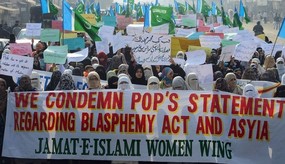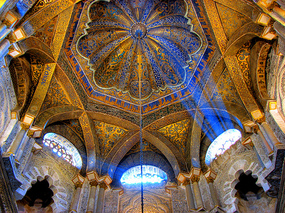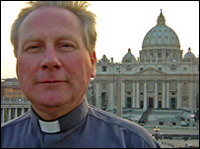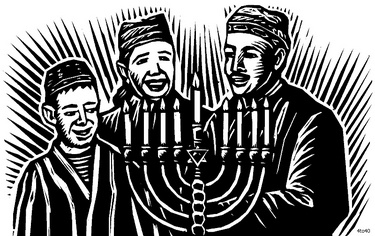Controversies never end between the Holy See and Islam. Dialogue between a Vatican group and an Egyptian one is now suspended in a surprising move. From what I can tell, some individuals are easily swayed by sentiment and the immediacy of political power and not by true faith and reason. Not to mention the poor translations of speeches given by the Pope. This is not a new issue and it is a matter of concern. I am inclined to say that the tensions originate not in Pope Benedict’s statements on Islam and Christianity, religious freedom and reciprocity, and faith and reason, but the tensions in Egypt (and other Islamic countries) over secularizing tendencies of some government leaders and the more conservative religious types. Islam, like Christianity, is in a precarious situation with the faith not being able to fruitfully interact in society. They are facing what 1968 was for the West. Islam is losing ground with many people, though it’s hard to prove this on occasion. On the other hand, I am not convinced, from what I read coming from certain religious leaders in Islam, that broadening reason by faith is a priority. They say one thing and do something opposite. Many of them can’t (won’t?) distinguish secularity from secularism. Certainly conflicting statements and reversing previously held “positions” is confusing and leading to heightened anxieties.
Category: Interfaith Dialogue
Pakistani Muslims Protest Pope
 Pakistani Muslims protested the part of Pope Benedict’s State of the World address where he says the blasphemy law ought to be repealed. Well, Pakistan’s Muslims don’t think it’s wise.
Pakistani Muslims protested the part of Pope Benedict’s State of the World address where he says the blasphemy law ought to be repealed. Well, Pakistan’s Muslims don’t think it’s wise.
Policeman shoots 4 Christians in Egypt, shouting Allah is great
The online magazine Catholic Culture (here below) carried this story today, which ran yesterday in the AFP, about a Muslim policeman killing Christian women when tensions are already running following the killing of Christians in a church. More sadness for humanity. It is also incredibly sad that the Egyptian Ambassador to the Holy See has stated that the view that Christians are not persecuted. Can you believe it??? The Ambassador’s head is in the sand.
Less than two
weeks after a church bombing in Alexandria left 21 Coptic Christians dead, an
off-duty policeman shot four Christians on a train, killing a 71-year-old man.
A fifth person was also wounded.
Continue reading Policeman shoots 4 Christians in Egypt, shouting Allah is great
Bernard Fellay criticizes Pope unfairly over prayer at Assisi 2011
The Pope always
seems to get criticized at every twist-and-turn. He announced a gathering in
Assisi to have a World Day of Prayer in part to commemorate the 25th
anniversary of the first Day of Prayer hosted by John Paul II and to build
bridges -he is the Pontiff, the “bridge builder”–after all. Benedict’s noble
and good motive is this: “I will make a pilgrimage to the town of St Francis,
inviting my Christian brethren of different confessions, leaders of the world’s
religious traditions and, in their hearts, all men and women of good will, to
join me on this journey in order to commemorate that important historical
gesture of my predecessor, and solemnly to renew the commitment of believers of
all religions to live their religious faith as a service to the cause of peace.”
Continue reading Bernard Fellay criticizes Pope unfairly over prayer at Assisi 2011
Pope Benedict XVI and the Way to Peace
These early days of 2011 are shaping up to be an interfaith challenge with all sorts of messages, clarifications and critiques of current events between Christians and Muslims. The latest, noted here, is a statement given by the Pope’s ambassador, the Apostolic Nunccio to Egypt, Archbishop Michael L. Fiztgerald, M. Afr. The Nuncio,73, is a former head of the Pontifical Council for Interreligious Dialogue. The statement was given in response to a request of the Coptic Orthodox Patriarchate clarifying the Pope’s January 2nd statement against the attacks against the Coptic faithful.
The statement of His
Holiness Pope Benedict XVI with regard to the tragic attack on the Church of
the Saints in Alexandria has met with some criticism. It may therefore be
helpful to give an account of what the Pope actually said and of his recent
teaching on the way to peace.
Ahmed al-Tayeb criticizes Benedict for interfering in Egypt; AND a response given
Jesuit Father
Federico Lombardi, Director of the Holy See Press Office, responded to what I
believe is unfair, even bigoted criticism of Pope Benedict by Imam Ahmed al-Tayeb of Egypt
following the January 1st bombing of a Coptic Orthodox church. 21 dead and
nearly a 100 wounded. Clear it is to me, the Muslim world rarely pays close attention to what the Catholic Church believes and what the Pope says.
Ahmed al-Tayeb, current current Imam of al-Azhar Mosque,
condemned the bombing. The imam paid a visit to the head of the Coptic Orthodox
Church, Pope Shenouda III to offer condolences. But his good will toward the
Christians however, also include a strident criticism Pope Benedict who asked civil
authorities to protect Christians. In Al-Tayeb’s mind the Pope’s request was an
“unacceptable interference in Egypt’s affairs.” Further, said al-Tayeb, “I
disagree with the Pope’s view, and I ask why did the Pope not call for the
protection of Muslims when they were subjected to killings in Iraq?”
Continue reading Ahmed al-Tayeb criticizes Benedict for interfering in Egypt; AND a response given
Happy Hanukkah 2010
Catholics don’t celebrate Jewish holy days, why?
Not long ago a friend asked me why Catholics don’t celebrate
the Jewish holy days. Good question.
A response to the question as to why we
don’t celebrate the Jewish holy days would be along these lines: the Paschal
Triduum is the Christian Passover, the true Pasch. Even the Greek and Latin
name for Easter tells us that (as also the derivation of the name for Easter in
Spanish, French, Italian from the same root).
In one sense, Jesus’ teaching was
in continuity with Judaism (Mt 5.17: “Think not that I have come to abolish
the Law”); but he also in Matthew 5 puts himself forward as a higher Lawgiver
than Moses (“you have heard it said, but I tell you…”). I suggest
reading Rabbi Jacob Neusner’s book, A Rabbi Talks with Jesus, which makes this
point very clear. The Pope himself said in Jesus of Nazareth that Neusner’s book is
an excellent example of honest and reasoned argument between a believing Jew
and the Jesus of the gospels.
Continue reading Catholics don’t celebrate Jewish holy days, why?
Muslim man dances on altar
On October 11, a Muslim managed to get up and dance on
the altar of the Florence’s Basilica di Santa Maria del Fiore, the famed cathedral church of the Archdiocese of Florence.
of this unbelievable event. The perpetrator does not speak Italian, but it’s reported that he prayed several time in Arabic.
No Islamic worship in former mosque, bishop says
 Euronews reported today that the bishop of Córdoba, Bishop Demetrio Fernández González made a decision not allow Muslim worship in a former mosque in what is today a Roman Catholic Cathedral. I believe that Bishop Demetrio made a correct and prudent decision here.
Euronews reported today that the bishop of Córdoba, Bishop Demetrio Fernández González made a decision not allow Muslim worship in a former mosque in what is today a Roman Catholic Cathedral. I believe that Bishop Demetrio made a correct and prudent decision here.

Spanish city of Córdoba, once the seat of Muslim power in Spain, said that he
will not permit Islamic worship at the city’s cathedral. The cathedral was
formerly a mosque, which in turn had been built on the site of a Catholic
church.
an interview, “is a euphemism which means: get Catholics out of here … The
answer to the question about sharing the Cathedral is that no, we’re not,
because this place has been a Catholic church 16 centuries, while Muslims have
been four and half centuries.”
cathedral of Cordoba, it is equivalent to Catholics saying goodbye and good
night; it would be irresponsible,” he added. “There are things that are
shared and others that are not, and the cathedral of Cordoba is not shared with
Muslims (…)”

